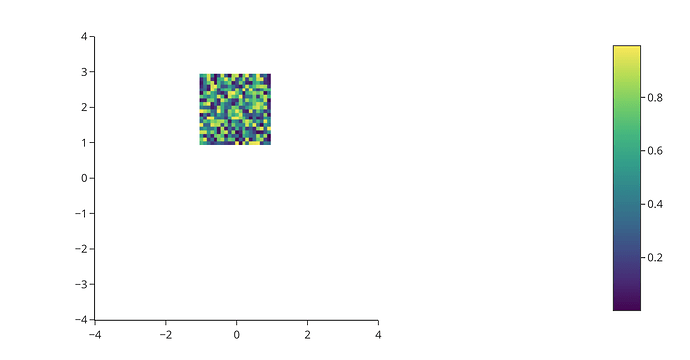It is possible to draw this in plotly?
Yes, it is possible to get such a plot defining a figure that consists in an empty scatter plot, and a Heatmap defined as an inset:
import plotly.graph_objs as go
import numpy as np
trace1 = go.Scatter(x=[-4, 4],
y=[-4, 4],
mode='markers',
marker_size=0.1)
trace2 = go.Heatmap(
z=np.random.rand(400).reshape((20,20)),
colorscale='Viridis',
showscale=False,
xaxis='x2',
yaxis='y2'
)
fig = go.Figure(data=[trace1, trace2])
axis_style= dict(showline=True,
zeroline=False,
showgrid=False,
mirror=True,
ticklen=3,
range=[-4, 4])
fig.update_layout(width=500, height=500,
template='none',
xaxis =axis_style,
yaxis=axis_style,
xaxis2=dict(domain=[0.33, 0.67],
anchor='y2',
visible=False),
yaxis2=dict(domain=[0.61, 0.95],
anchor='x2',
visible=False))
```
1 Like
Thank you for your help!
This version does it in a single subplot… a bit more tweaking in the update_*axes can get you the ticks you want and the lines on the right and top 
fig = px.imshow(
np.random.rand(400).reshape((20,20)),
x=np.arange(-1,1,0.1),
y=np.arange(1,3,0.1),
origin="lower",
color_continuous_scale="Viridis",
template="simple_white"
)
fig.update_xaxes(range=[-4,4], autorange=False)
fig.update_yaxes(range=[-4,4], autorange=False)
fig.show()
1 Like
It’s more succint using plotly.express. Thank you!
Hello,
Revived this topic because i have a problem with x axis.
Based on Empet’s approach i tried this:
import plotly.graph_objs as go
import numpy as np
from matplotlib.colors import LightSource
import matplotlib.pyplot as plt
dem = np.load('topo.npz')
z = dem['elevation']
dx, dy = dem['dx'], dem['dy']
dy = 111200 * dy
dx = 111200 * dx * np.cos(np.radians(dem['ymin']))
ls = LightSource(azdeg=315, altdeg=45)
cmap = plt.cm.gist_earth
rgb = ls.shade(z, cmap=cmap,vmin=0,vmax=2500, blend_mode='overlay',vert_exag=5, dx=dx, dy=dy)
img = np.array((255*rgb[:, :, :3]+0.5), int)
# MAP BOUNDARIES (latitude and longitude)
lon_min = dem['xmin'] # 28.18
lon_max = dem['xmax'] # 28.88
lat_min = dem['ymin'] # 37.50
lat_max = dem['ymax'] # 37.88
# Dummy for map boundaries
trace1 =go.Scatter(x=[],y=[],
mode='markers',
marker_size=0.1)
trace2 =go.Image(z=img,xaxis='x2',yaxis='y2')
fig = go.Figure(data=[trace1, trace2])
fig.update_layout(
xaxis = dict(visible=True, range=[lon_min, lon_max],),
yaxis = dict(visible=True, range=[lat_min, lat_max]),
xaxis2 = dict(visible=False),
yaxis2 = dict(visible=False,autorange=True),
)
fig.show()
My x axis does not correspond to given boundaries (28.11 - 28.88)
How can i fix this ?
Best regards.
If anyone else have the same problem here’s the solution :
import plotly.graph_objs as go
import numpy as np
from matplotlib.colors import LightSource
import matplotlib.pyplot as plt
dem = np.load('topo.npz')
z = dem['elevation']
dx, dy = dem['dx'], dem['dy']
dy = 111200 * dy
dx = 111200 * dx * np.cos(np.radians(dem['ymin']))
ls = LightSource(azdeg=315, altdeg=45)
cmap = plt.cm.gist_earth
rgb = ls.shade(z, cmap=cmap,vmin=50,vmax=3000, blend_mode='overlay',vert_exag=8, dx=dx, dy=dy)
img = np.array((255*rgb[:, :, :3]+0.5), int)
# MAP BOUNDARIES (latitude and longitude)
lon_min = dem['xmin'] # 28.18
lon_max = dem['xmax'] # 28.88
lat_min = dem['ymin'] # 37.50
lat_max = dem['ymax'] # 37.88
# Dummy for map boundaries
fig=go.Figure(go.Scatter(x=[],y=[],
mode='markers',
marker_size=0.1
)
)
fig.add_trace(go.Image(z=img,
xaxis='x2',yaxis='y2',
customdata=np.round(z,2),
hovertemplate='Elavation (m): %{customdata}<extra></extra>'
)
)
fig.update_layout(hovermode='closest',
xaxis = dict(visible=True,
showline=True,
linewidth=3,
linecolor='black',
mirror=True,
side='top',
ticks='outside',
tickwidth=2,
ticklen=5,
tickcolor='black',
range=[lon_min, lon_max],
tick0=lon_min, dtick=0.01
),
yaxis = dict(visible=True,
showline=True,
linewidth=3,
linecolor='black',
mirror=True,
ticks='outside',
tickwidth=2,
ticklen=5,
tickcolor='black',
range=[lat_min, lat_max],
tick0=lat_min, dtick=0.01
),
xaxis2 = dict(visible=False,
matches='y2'
),
yaxis2 = dict(visible=False,
autorange=True,
scaleanchor='x2'
)
)
fig.show()```


